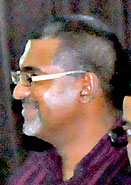Up to last night, the Government and university teachers were stuck in a deadlock over demands for a salary increase. Lecturers have threatened to go on a general strike to gain their demands.
Members of the Federation of University Teachers’ Associations (FUTA) say they will abandon their academic posts with effect from tomorrow, as a preliminary step towards a possible general strike, if their demands were not met.
 |
 |
| S. B. Dissanayake holds a news conference to explain the situation on Friday. Pic by Mangala Weerasekera |
Dr. Mahim Mendis, spokesman, Federation of University Teachers’ Associations |
Ahead of tomorrow’s action, the University Grants Commission (UGC) has issued a circular saying university teachers had to give three months’ notice of resignation, and could not resign overnight.
The Federation of University Teachers’ Associations FUTA also said it would refuse to mark GCE Advanced Level answer scripts if the salary issue was not sorted out by August.
“The Advanced Level is the highest level university entrance qualifying exam, and the marking of A/Level answer scripts is a quality process that has to be led by university academics,” federation spokesman Dr. Mahim Mendis told the Sunday Times. “But if our salaries are not revised by August, we will have to go ahead with the boycott,” he said.
“This is a matter that requires serious consideration by the government. If disputes involving academics are not speedily sorted out, very soon there will be no tertiary academics to give lectures, and this would affect the entire university system. The students and the staff will be affected”, said Dr. Mendis, who is also president of the Teachers’ Association of the Open University of Sri Lanka.
Some 4,000 university professors and lecturers have been demanding a “dignified salary increment” since September 8, 2008. The first proposal for an increment was submitted by the Ministry of Higher Education to the National Salaries and Cadres Commission, after consultation with the federation. The proposal was re-submitted two years later, on August 5, 2010.
Since 2008, there have been many discussions on salary increment between the federation and government representatives, including Ministers and the President.
“We started our trade union action with a token strike in mid-2010, before resubmitting the salary revision proposal in August 2010,” Dr. Mendis said. “Since then, we have warned the government that unless the problems are resolved in line with the promises given us, we will go ahead with the trade union action.”
Dr. Mendis said the Minister of Higher Education should consider the status of institutions designated as universities, “a status conferred by the President when he spoke about transforming the country into a knowledge hub, and a status conferred on those who man the universities, the highest seat of learning.”
According to Dr. Mendis, around 550 holders of doctorates and other highly qualified lecturers have left the country for better opportunities overseas.
Meanwhile, Higher Education Minister S. B. Dissanayake has appealed to federation members not to go ahead with the trade union action. The Minister pointed out that university lecturers were given a 36.25 per cent salary increase in the 2011 Budget, while other government employees were given only a 5 per cent increase.
“The Federation of University Teachers’ Associations can bring up their issues with the President and the Ministry of Higher Education to resolve this dispute,” Minister Dissanayake said. “The government has given university lecturers a bigger salary increase than it has many other government professionals.”
The 36.25 per cent salary increase comprises a 5 per cent general increase on the basic salary, a 6.25 per cent for academic work, and a 25 per cent for research.
The Federation of University Teachers’ Associations claims that a separate 25 per cent research allowance had been unfairly bundled with the salary raise.
“Our academics are free to engage in academic work in other higher education institutions,” Minister Dissanayake said. “Many foreign universities are coming to Sri Lanka, and university lecturers have great opportunities to make extra money.”
According to University Grants Commission chairman, Professor Gamini Samaranayake, university lecturers holding portfolios cannot resign just as they wish. “These lecturers will not be accepted to any academic post if they resign from their official duties,” Professor Samaranayake told the Sunday Times. “It was the UGC that gave them their appointments as heads of departments. If they want to resign, they should give the UGC three months’ notice.”
The Minister of Higher Education said other university lecturers were ready to stand in for federation members who refused to mark Advanced Level examination answer scripts. |



